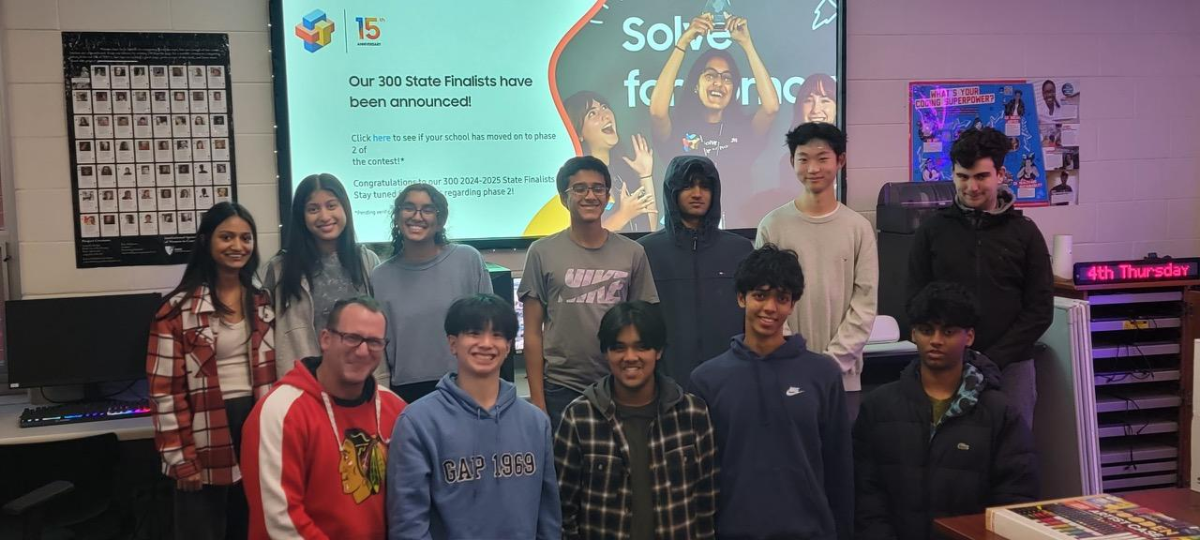Debates on the use of Artificial Intelligence (AI) are gaining popularity. Teachers are becoming more and more open to the use of AI and are allowing students to use it in supervised moderation. From art to computer science, AI is being integrated right into school academics.
The Vernon Hills Student Handbook prohibits the use of generative AI technology in place of original work. However, AI use is allowed when deemed appropriate by staff. Teachers and students share experience in specific instances of AI usage inside classrooms.
Adam Lueken, Computer Science teacher, has fun teaching students and trying new things in his classroom. Lueken uses AI in his computer science classes to achieve higher results in projects, complete them more quickly and have more advanced functions.
“My expectation is that [the students] utilize [AI in order to] make a project better, faster, [and] more finished than previously,” Lueken said.
Last year, Lueken’s Computer Science club created a walking stick for a competition called Samsung Solve for Tomorrow. This global contest, created by Samsung Electronics, is for public school students to develop problem solving STEM skills in order to positively impact society.
The walking stick project helped people with visual impairments, using machine vision learning to alert the user of obstacles in their way. Similar to how ChatGPT uses machine learning, the walking stick was able to gather visual information, and interpret when an alert would need to go off to warn the user of the obstacles. According to Lueken, without AI, the project would not have been effective.
“We would not have been able to get anything close to [the walking stick],” Lueken said.
Laasya Manikonda (12) is in Lueken’s Computer Science club. She participated in the Samsung competition.
“Visually, [the walking stick] learned these certain objects [on a field of vision] it… had [an] alert that would [inform the user of the] object in front of you,” Manikonda said.
With their walking stick project, the students became State Finalists.
“This year, we’re trying to be [the] Illinois winner,” Manikonda said.
Paige Polen (10) keeps up with The Scratching Post (TSP), and loves the crossword puzzles. Polen has also used AI to help her learn.
She is currently in Algebra II Honors and uses ChatGPT to guide her, step by step, through problems she does not understand. Polen uses AI because it has the ability to specialize in what an unique individual needs assistance in.
“You can type in the most specific thing, and [ChatGPT] will give you that answer,” Polen said.
Last year, in Biology Honors, Polen gave difficult vocabulary words to ChatGPT and asked it to quiz her. Using such methods, she has gained confidence in her academic skills.
“[AI] has helped my grades tremendously. It has changed my academic perspective… [and] I’m able to grasp the concepts a lot better,” Polen said.
Polen also expresses her disapproval of using AI for cheating. She believes that the misuse of AI by students is responsible for pushing other students away from it.
“Since AI has the reputation of helping people cheat, people look down on it, and I think that we need to look past that fact and use it as a helpful tool,” Polen said.
Justin Miller (11) is an art student in Allison Molloy’s Digital Photo Studio. He has been using AI ever since around 2022, from playing around with AI opportunities to training multiple AI models. Today, Miller continues to use AI. In his art class, Miller uses Adobe Photoshop’s auto-removal AI tool for removing unwanted stuff in images.
As for concerns on AI replacing real art from artists, Miller is not worried.
“The people who are using AI to generate art are not the ones who really care about real art,” Miller said.
Miller thinks of AI as a support tool, one that is not unique, but rather, one that is a combination of its given information.
“The people who actually want to see art, want to see something that was made with intention, [and they] are gonna go back to real artists,” Miller said.
Christopher Wolf, Science teacher, sees AI as a useful tool with the potential to speed up development and advancement in the science field. One way AI is able to contribute to this is by having an ability for predicting protein folding. This information can be used to create drugs, in order to help treat diseases.
“We have basically all the information available on what we know about proteins, to help us predict what these proteins might actually end up doing without having to wait to test them,” Wolf said.
This way, AI can gather data more efficiently than people.
“The amount of information available is going to really accelerate the field of producing proteins that might do a lot of good for society,” Wolf said.
Like Lueken and Miller, Wolf believes that AI will not take over human responsibilities. Even if AI makes a prediction, testing it will be essential.
“The nature of science is that we are constantly testing and retesting to make sure our claims are supported by that evidence,” Wolf said.
Like many others, Wolf believes that AI is beneficial when used in proper moderation.
“I don’t think [AI] should replace things like reading from the textbook,” Wolf said. “[But it is a] tool in your tool belt to use.”

